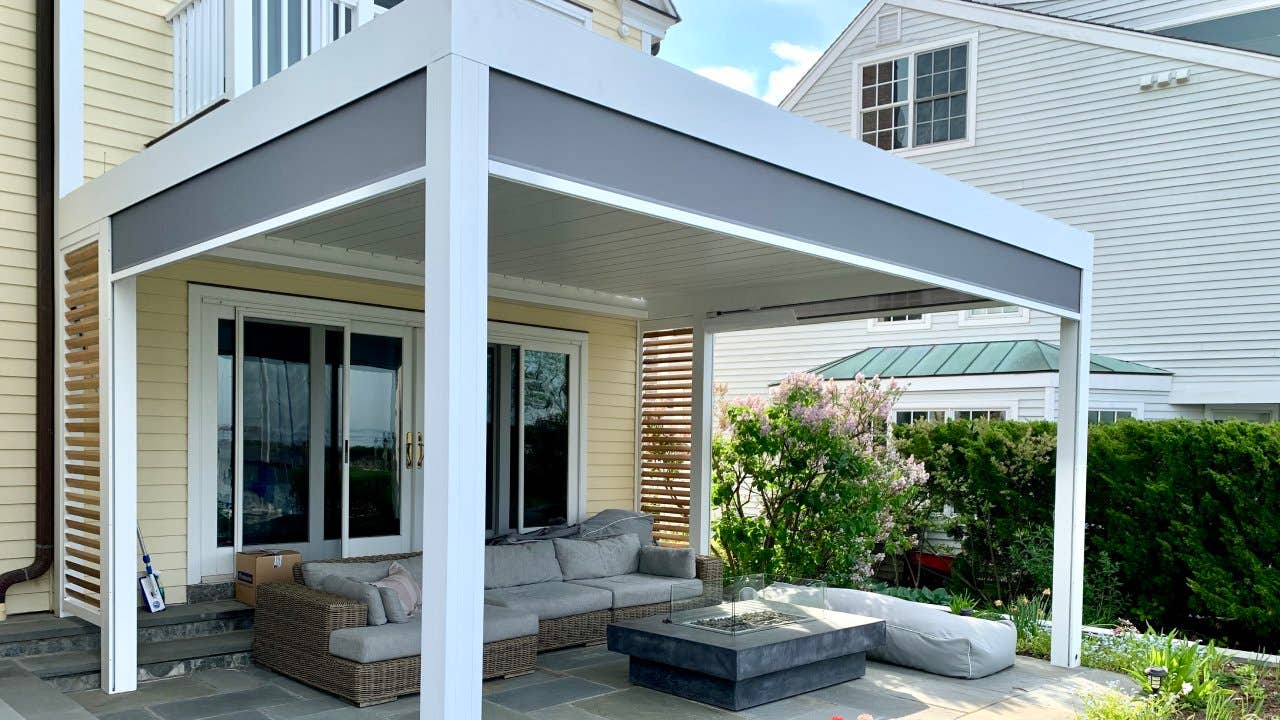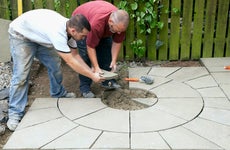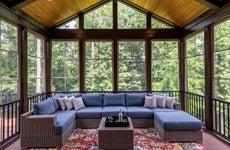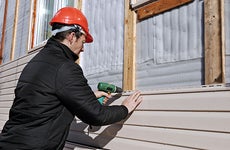What does a pergola cost?

The Bankrate promise
At Bankrate we strive to help you make smarter financial decisions. While we adhere to strict , this post may contain references to products from our partners. Here's an explanation for .
For those seeking shade, pergolas are so hot now. Online searches for construction kits have more than tripled since 2021, says Wayfair’s 2022 Outdoor Trends report. While the name may sound unfamiliar, you’d know one if you saw one: It’s al fresco, open, squarish structure, either attached to a house or free-standing, that consists of four columns and roofing beams or rafters. Traditionally, the ceiling is open, though some have a completely closed cover to shelter you from the elements.
“A hot glaring sun and cold wet winds can both be successfully subdued with a pergola that is constructed with careful consideration to design and orientation,” says Shaun Martin, a real estate expert based in Denver.
Building a pergola can be a sizable investment. According to Angi, the contractor search service, costs range from $10 to $60 per square foot, depending on the materials used, the size, and other factors. Our guide dives into pergola costs and whether it’s a wise idea to tackle construction as a DIY project.
Types of pergolas
Pergolas can built in two basic ways Here are the different kinds and costs associated with each:
- Prefab: Prefab kits come ready to assemble. You’ll receive the material (wood, vinyl, etc.) pre-cut and notched. Prefab kits can run you from $600 to $7,500. You can buy a prefab kit and retrofit it to your property’s requirements.
- Custom: Creating a pergola from scratch means having materials cut and designed at your exact specifications. Custom pergolas can run as high as $15,000, making them more expensive on average than prefab kits. There are exceptions, though, depending on the material: A prefab kit consisting of vinyl material is costlier than custom options with treated lumber, according to Fixr.com.
What influences a pergola’s cost?
A variety of things can impact the price tag of a pergola.
The size of your pergola affects how much it costs. The smallest size for one is 10-feet by 10-feet and is $1,100-$3,000 for a prefab kit or $1,700-$4,500 for a custom one. Conversely, the largest ones available (20’x20’) cost $6,000-$10,000 for prefab pergolas and $5,000-$15,000 for custom jobs.
Moreover, the materials you use will also impact your investment.
Pergola Prices by Material
| Material | Average costs for prefab kits | Average costs for custom | Characteristics |
|---|---|---|---|
| Source: Fixr | |||
| Metal | $500-$3,000 | N/A | Lighter weight, it’s durable and offers fresh looks depending on metal selected |
| Wood | $500-$10,000 | $500-$9,000 | Exotic woods like (Redwood or pine) for a unique appearance |
| Alumawood | $1,500-$3,000 | N/A | Inexpensive, looks like wood but is more resistant to the elements due to its aluminum treatment |
| Fiberglass | $1,500-$10,000 | N/A | Low maintenance, durable material that meshes well with contemporary designs |
| Composite | $1,500-$3,000 | N/A | You don’t need to stain the material and it’s resistant to rot and insects |
| Vinyl | $1,500-$7,000 | N/A | Very lightweight but not as durable as other materials. Can be prone to cracking in extreme temperatures |
| Brick | $2,000 to $4,000 | N/A | You can only apply brick to the columns, resulting in a unique look, especially if you have a brick patio |
Standalone pergolas often cost slightly more than ones attached to a house. Finally, special features, like adding a motorized frame to stretch or retract the canopy, can Pacman your budget: Motorized pergolas run $8,000-$14,000, for example.
Should you build a pergola yourself?
There are some advantages to building a pergola on your own, such as:
- You save money: Labor costs for building a pergola average between $500-$1,000. However, they can easily soar higher for custom-built jobs, or if higher-end/harder-to-work-with materials come into play.
- Prefab kits do some of the work for you: A prefab kit contains all the pre-drilled and pre-cut materials. You don’t have to do any of the measurements to trim them. And it includes all the hardware you need. So, if you have advanced carpentry skills and a few helpful friends, the project is easy to assemble.
- Design flexibility: “When you design and construct your pergola yourself, it will give a unique touch to the final output,” remarks Matt Ward, a realtor and team lead with The Matt Ward Group in Franklin, Tennessee. “The owner can customize their own needs into the pergola as long as the structure is sound and safe.”
On the other hand, keep these things in mind before diving into the project:
- Difficulty: While prefab kits have everything you need, it can still be daunting to put them together. The Family Handyman notes building a pergola requires advanced skills. And due to their height, you’ll need assistance as you assemble them.
- Time: “If you are new to constructing structures from wooden or other strong materials, it takes a lot of time to finish the project,” adds Ward. “So, it is not time efficient.”
- Missing an expert perspective: A pergola that fits well within the framework of your yard ties the property together. Mis-size it, and you could end up building a pergola that dominates the landscape or looks mismatched to your house. An expert ensures you have a pergola that enhances your space, but doesn’t overwhelm it.
Final word on pergolas
More people want to utilize their yards and lawns as part of their living space. As such, pergolas fit this need, providing structure, cohesion, and a degree of shelter that can make your environs more functional — like for a home office, say.
Done right, pergolas tie the outdoor space together, increasing its appeal both to you and prospective homebuyers. Done wrong, though, and you may have an expensive eyesore to deal with.
Related Articles



